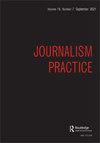(联合国)报道仇外心理:塞浦路斯网络新闻中移民问题的正常化和抵制官员的歧视性言论
IF 2
2区 文学
Q2 COMMUNICATION
引用次数: 0
摘要
摘要本文借鉴已有的研究,认为媒体话语可能有助于使仇外情绪正常化。它的目标是推进这些研究,不仅调查记者如何成为归化官员表达的反移民立场的同谋,还调查记者抵消仇外言论正常化的潜力。在此过程中,文章强调了网络新闻生产的特点所起的作用。本研究采用了一种多方法的研究设计,从两个独立但相互关联的层面来研究在线新闻报道:通过话语分析对移民的媒体报道,以及通过对新闻制作人的深度采访对新闻生产过程的报道。研究结果表明,怪圈主义、耸人听闻的报道、对精英资源的过度依赖,以及将移民和难民视为威胁、将塞浦路斯视为受害者的话语建构,都在强化仇外情绪的正常化。分别将移民和难民代表为权利持有人,将塞浦路斯代表为义务承担者,从不同来源获取信息,进行调查性新闻报道,并以非负面的角度(重新)将与移民有关的新闻置于背景中,这些都是抵制和挑战仇外言论的要素。然而,记者需要付出额外的努力,以超越标准化的在线新闻生产实践,这些实践有助于再现仇外叙事。关键词:新闻实践、媒体话语、网络新闻、仇外心理、媒体抵制、塞浦路斯新闻、移民、新闻制作致谢作者感谢参与本研究的参与者分享他们的观点和经验。披露声明作者未报告潜在的利益冲突。注1没有Philenews和Sigmalive的单次访客数据。这项工作得到了塞浦路斯大学启动计划补助金的支持。本文章由计算机程序翻译,如有差异,请以英文原文为准。
(Un)Reporting Xenophobia: Normalising and Resisting Officials’ Discriminatory Discourse on Migration in Online Journalism in Cyprus
ABSTRACTThis article draws on existing research suggesting that media discourses may contribute in normalising xenophobia. Its objective is to advance these studies by investigating not only how journalists become complicit in naturalising officials’ expressed anti-immigration stance, but also the potential of journalists to counterbalance the normalisation of xenophobic discourse. In doing so, the article emphasises the role of the features of the online news production. The research draws on a multimethod research design that approaches online journalistic reporting on two separate yet interconnected levels: the media reports on migration, through discourse analysis, and the news production process, through in-depth interviews with news producers. The findings reveal that churnalism, sensationalist reporting, excessive reliance on elite sources and the discursive construction of immigrants and refugees as threat and Cyprus as victim work to reinforce the normalisation of xenophobia. Respectively, representing immigrants and refugees as rights-holders and Cyprus as duty-bearer, drawing information from diverse sources, conducting investigative journalism and (re)contextualising migration-related news in a non-negative perspective are elements that resist and challenge xenophobic discourse. However, journalists need to put in extra effort to overpass standardised online news production practices that facilitate the reproduction of xenophobic narratives.KEYWORDS: Journalism practicemedia discourseonline journalismxenophobiamedia resistanceCyprus journalismmigrationnews production AcknowledgementsThe authors are grateful to the participants who accepted to share their views and experiences in this research.Disclosure StatementNo potential conflict of interest was reported by the author(s).Notes1 There are no single visitors data available for Philenews and Sigmalive.Additional informationFundingThis work was supported by the University of Cyprus Start-Up Scheme Grant.
求助全文
通过发布文献求助,成功后即可免费获取论文全文。
去求助
来源期刊

Journalism Practice
COMMUNICATION-
CiteScore
5.50
自引率
14.30%
发文量
111
期刊介绍:
ournalism Practice provides opportunities for reflective, critical and research-based studies focused on the professional practice of journalism. The emphasis on journalism practice does not imply any false or intellectually disabling disconnect between theory and practice, but simply an assertion that Journalism Practice’s primary concern is to analyse and explore issues of practice and professional relevance. Journalism Practice is an intellectually rigorous journal with all contributions being refereed anonymously by acknowledged international experts in the field. An intellectually lively, but professionally experienced, Editorial Board with a wide-ranging experience of journalism practice advises and supports the Editor. Journalism Practice is devoted to: the study and analysis of significant issues arising from journalism as a field of professional practice; relevant developments in journalism training and education, as well as the construction of a reflective curriculum for journalism; analysis of journalism practice across the distinctive but converging media platforms of magazines, newspapers, online, radio and television; and the provision of a public space for practice-led, scholarly contributions from journalists as well as academics. Journalism Practice’s ambitious scope includes: the history of journalism practice; the professional practice of journalism; journalism training and education; journalism practice and new technology; journalism practice and ethics; and journalism practice and policy.
 求助内容:
求助内容: 应助结果提醒方式:
应助结果提醒方式:


